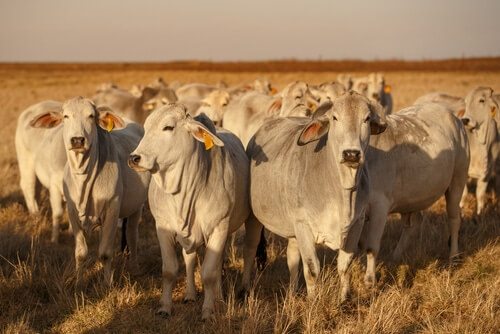Live cattle closed higher on Monday, while lean hog finished lower as consumers switched to cheaper pork from pricier beef.
The Chicago Mercantile Exchange (CME) live cattle futures for December delivery shed 1.31% to ¢181.40 per pound on November 06. Similarly, feeder cattle January futures declined 2.39% to ¢236.38 per pound.
With prices lackluster all around, packers may reduce purchases to pressure producers into lowering prices. Analysts predicted that live cattle may plummet to ¢181.23 and feeders to ¢236.25 in the upcoming market session.
Direct cash cattle show lists were mixed, rising in Kansas and Texas while falling in Nebraska and Colorado. However, trade volume remained low as bids and asking prices didn’t surface.
Boxed beef also ended the week’s opening day lower amid moderate offerings. Choice beef declined by 0.21% to $301.72, while Select beef went for $270.36, edging 0.61% lower.
On the other hand, the prices of steers and heifers remained steady as demand for cattle calves rose. According to the United States Department of Agriculture (USDA), the climate has become ideal for wheat pasture grazing.
Medium and large feeder steers weighing 508.00 to 539.00 pounds sold for $275.00 to $307.00 each. Meanwhile, medium and large feeder heifers of 568.00 to 596.00 pounds brought in $231.00 to $252.50 per animal.
Recently, most of the live cattle production regions in the US experienced increased precipitation and warmer temperatures. Such conditions facilitate faster growth for bovines, reducing the overall cost of livestock rearing.
Lean Hogs Snatch Demand from Live Cattle
American consumers have adopted a more cautious approach to spending this holiday season. Many have avoided buying pricey beef in favor of cheaper alternatives such as pork.
The move was reflected in lean hog futures for December delivery closing Monday’s market session 0.63% higher at ¢72.20 per pound. Demand for US pork has been consistently strong in recent months, especially after concerns about a possible government shutdown had developed.
The Federal Government faces another shutdown deadline on November 17, which may trigger a new wave of recession fears. Market watchers anticipate the resulting unease to support further acceleration in the prices of lean hogs.
Additionally, there is concern about the potential escalation of the Israel-Hamas conflict affecting the West. As the escalation may trigger a surge in gas prices, packers might avoid costlier commodities like live cattle.











